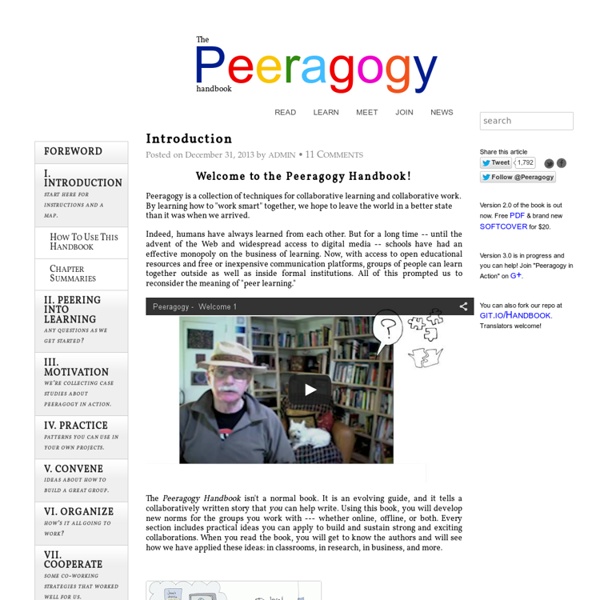



Crowd shaped: The future of online learning? The @chat2lrn crew are delighted to have a blog post this week from Kate Graham (@kategraham23) in which she explores Crowd Sourced Learning. In 2012, technology and collaboration collided in a big way and started to change the face of learning. Crowd sourced learning projects were the big story last year, a trend that seems set to continue. Over $70 million was invested by venture capitalists in crowd sourced learning, across a range of social and business sectors.
The Evolution of Classroom Technology Infographic Educational Technology Infographics The Evolution of Classroom Technology Infographic shows how we moved from pencil and paper to iPads and online platforms. Via: www.onlineschools.com Embed This Education Infographic on your Site or Blog! One The Event - Social Architecture "12 Pillars of Human Endeavor" Origins Originally designed by futurist & social architect, Barbara Marx Hubbard, Founder of the Foundation for Conscious Evolution, the 12 Pillars shown here (above) match & advance Barbara's popular12 point Wheel of Co-Creation (right) based on the Model of the Peace Room, which focuses on a world that works for all.
Connectivism: A Learning Theory for the Digital Age Connectivism: A Learning Theory for the Digital Age December 12, 2004 George Siemens Update (April 5, 2005): I've added a website to explore this concept at www.connectivism.ca Google Launches Open Course Builder Google launched an open source course building web application for the growing list of K-12 and big-name universities developing online classes. The barebones website is a lightweight way to bring course material online, track student engagement (with web traffic and surveys), and evaluate performance. “We want to use this launch to show that Google believes it can contribute to technology in education,” says Google’s Director of Research, Peter Norvig.
How to Send Better Email - Without Second-Guessing a Single Word Have you ever received an amazing email, one that you’d like to print out and pin to your wall, one that made you grin from ear to ear or slow-clap in appreciation and reverence? When I come across these gems, I drop them into a “Snippets” folder. I study them, I swoon over them, and I borrow bits and pieces of them to send better email.
The Definition Of The Flipped Classroom The Definition Of The Flipped Classroom As one of the most popular trends in education in recent memory, you’ve undoubtedly heard of the flipped classroom. But what is it about a classroom that’s been flipped that makes it unique? Unschooling Philosophy[edit] Children are natural learners[edit] A fundamental premise of unschooling is that curiosity is innate and that children want to learn. From this an argument can be made that institutionalizing children in a so-called "one size fits all" or "factory model" school is an inefficient use of the children's time, because it requires each child to learn a specific subject matter in a particular manner, at a particular pace, and at a specific time regardless of that individual's present or future needs, interests, goals, or any pre-existing knowledge he or she might have about the topic.
Connectivism Clarissa Davis, Earl Edmunds, Vivian Kelly-Bateman Department of Educational Psychology and Instructional Technology, University of Georgia Review of Connectivism Introduction Just like anything else that involves human experience or interaction, the act of learning does not happen in a vacuum. Open Course: Social Media & Open Education I will be facilitating an open graduate course this Fall titled EC&I 831: Social Media & Open Education. This will be the 5th time I have taught the course (first time was 2007), and it’s different each time. It looks like I will have about 25 graduate students taking this for credit (which is well over the usual limit), and I’m also inviting anyone out there interested in the experience to participate for free. If you would like to learn more about the course, go to If you’re familiar with the course (from past iterations), you’ll notice that I’ve abandoned the old wiki and moved over to a WordPress site as the ‘central’ space. If you are interested in participating, see the page for non-credit participants.
selfiecity The Selfie: Making sense of the “Masturbation of Self-Image” and the “Virtual Mini-Me” Alise Tifentale, The Graduate Center, CUNY This essay reviews some of the most recent debates on the selfie phenomenon and places it into a broader context of photographic self-portraiture, investigating how the Instagrammed selfie differs from its precursors. The 4 Stages Of Edtech Disruption The 4 Stages Of The Integration Of Technology In Learning by Terry Heick For professional development around this idea or others you read about on TeachThought, contact us. Technology can be used in the learning process in a variety of ways.
Word Matters Collective work by some thirty authors from civil societies all over the world, deciphers the central concepts of the information society”. Technology is never neutral: it carries social, economic and cultural consequences. New information and communication technologies are no exception.The words used in international negotiations or legislation are a poor reflection of such consequences; they propagate perceptions that are rarely subjected to democratic debate, the fundamental requirement for any political decision. This book subjects the concepts of the information age to critical perspectives from different sensibilities and cultures, thus introducing alternative visions. Fully multilingual, this work is a reference for anyone who aspires to decode these key issues, and is an invitation to pursue the debate.